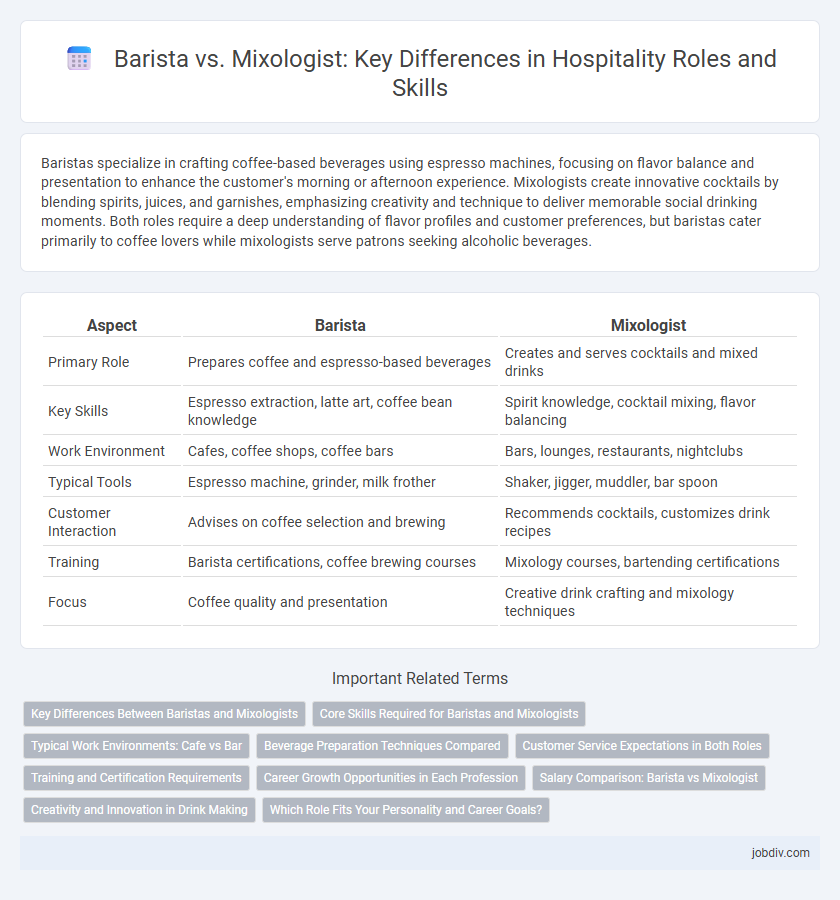Baristas specialize in crafting coffee-based beverages using espresso machines, focusing on flavor balance and presentation to enhance the customer's morning or afternoon experience. Mixologists create innovative cocktails by blending spirits, juices, and garnishes, emphasizing creativity and technique to deliver memorable social drinking moments. Both roles require a deep understanding of flavor profiles and customer preferences, but baristas cater primarily to coffee lovers while mixologists serve patrons seeking alcoholic beverages.
Table of Comparison
| Aspect | Barista | Mixologist |
|---|---|---|
| Primary Role | Prepares coffee and espresso-based beverages | Creates and serves cocktails and mixed drinks |
| Key Skills | Espresso extraction, latte art, coffee bean knowledge | Spirit knowledge, cocktail mixing, flavor balancing |
| Work Environment | Cafes, coffee shops, coffee bars | Bars, lounges, restaurants, nightclubs |
| Typical Tools | Espresso machine, grinder, milk frother | Shaker, jigger, muddler, bar spoon |
| Customer Interaction | Advises on coffee selection and brewing | Recommends cocktails, customizes drink recipes |
| Training | Barista certifications, coffee brewing courses | Mixology courses, bartending certifications |
| Focus | Coffee quality and presentation | Creative drink crafting and mixology techniques |
Key Differences Between Baristas and Mixologists
Baristas specialize in coffee preparation, mastering espresso machines, grinding techniques, and latte art to create high-quality coffee beverages that emphasize flavor profiles and consistency. Mixologists focus on crafting cocktails through expert knowledge of spirits, garnishes, and mixology techniques, often experimenting with ingredients to create innovative drink experiences. The key differences lie in their ingredient bases--coffee versus alcohol--and the specific skills required for beverage preparation, presentation, and customer interaction within cafes versus bars.
Core Skills Required for Baristas and Mixologists
Baristas require expertise in coffee brewing techniques, espresso machine operation, and latte art to deliver high-quality beverages consistently. Mixologists must master cocktail recipes, ingredient balancing, and garnishing skills to create innovative and flavorful drinks. Both roles demand strong customer service abilities, attention to detail, and a deep understanding of flavor profiles to enhance the guest experience.
Typical Work Environments: Cafe vs Bar
Baristas typically work in cafes, coffee shops, and casual dining establishments where they prepare espresso-based drinks and focus on customer interaction in a cozy, daytime setting. Mixologists are found primarily in bars, lounges, and nightclubs, crafting innovative cocktails and managing beverage service in a dynamic, often nighttime environment. While both roles require specialized knowledge of flavors and techniques, their work environments reflect distinct atmospheres and operational hours.
Beverage Preparation Techniques Compared
Baristas specialize in the art of espresso extraction, milk texturing, and precise coffee brewing methods that emphasize flavor balance and crema quality. Mixologists master cocktail crafting through techniques such as muddling, shaking, stirring, and layering, focusing on ingredient synergy and presentation aesthetics. Both roles require expert knowledge of ingredient combinations and temperature control to create distinct beverage experiences tailored to customer preferences.
Customer Service Expectations in Both Roles
Baristas and mixologists each excel in customer service by tailoring their interactions to specific beverage experiences, with baristas emphasizing quick, personalized coffee preparation and mixologists offering crafted, experiential cocktails that engage guests. Both roles require attentiveness, product knowledge, and the ability to anticipate customer preferences to enhance satisfaction and encourage repeat visits. High-quality service in either position involves clear communication, a welcoming attitude, and expertise in beverage presentation to exceed customer expectations in hospitality settings.
Training and Certification Requirements
Baristas typically undergo specialized training programs focused on coffee brewing techniques, latte art, and espresso machine operation, often earning certifications such as the Specialty Coffee Association (SCA) Coffee Skills Program. Mixologists require comprehensive training in bartending skills, cocktail recipes, flavor pairings, and responsible alcohol service, with certifications like TIPS or the International Bartenders Association (IBA) credentials. Both professions emphasize practical experience and continuous education, but mixologists face stricter regulatory requirements due to alcohol laws.
Career Growth Opportunities in Each Profession
Baristas often progress into roles such as coffee shop managers, roasters, or specialty coffee consultants, leveraging skills in espresso techniques and customer service. Mixologists have career growth opportunities leading to bar managers, beverage directors, and brand ambassadors, capitalizing on expertise in cocktail crafting and flavor profiling. Both professions offer paths into product development, training, and hospitality management, but mixologists typically experience faster advancement in upscale venues and event-based settings.
Salary Comparison: Barista vs Mixologist
Baristas typically earn an average hourly wage of $12 to $18, influenced by experience and location, while mixologists command higher salaries ranging from $15 to $30 per hour due to specialized skills and knowledge of craft cocktails. National data shows mixologists in metropolitan areas often receive tips and bonuses that significantly increase overall earnings compared to baristas. The hospitality industry's demand for skilled mixologists in upscale venues drives their higher compensation relative to baristas in standard coffee shops.
Creativity and Innovation in Drink Making
Baristas and mixologists both embody creativity and innovation in drink making, yet their expressions differ significantly; baristas experiment with coffee brewing techniques, latte art, and unique flavor combinations to elevate the coffee experience. Mixologists push the boundaries of cocktail crafting by blending spirits, infusions, and garnishes to create visually stunning and tastefully complex beverages. Both roles require a deep understanding of ingredients, precision, and artistic flair to captivate customers and deliver memorable flavors.
Which Role Fits Your Personality and Career Goals?
Baristas excel in crafting high-quality coffee beverages, requiring patience, precision, and a passion for coffee culture, making it ideal for those who enjoy consistent routines and customer interaction. Mixologists specialize in creating innovative cocktails, blending creativity with deep knowledge of spirits, suited for individuals who thrive in dynamic nightlife environments and enjoy experimentation. Choosing between these roles depends on whether your personality aligns with the structured artistry of coffee preparation or the spontaneous creativity of cocktail crafting, directly impacting your long-term career satisfaction in hospitality.
Barista vs Mixologist Infographic

 jobdiv.com
jobdiv.com